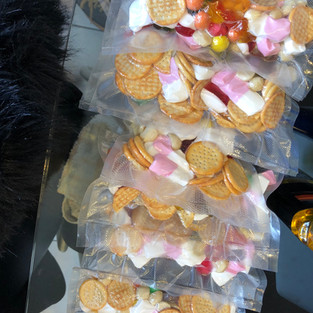A week to go.....
- James Yeardley
- Sep 15, 2018
- 3 min read
Updated: Sep 16, 2018
With a week to go until the Grand 2 Grand ultra, today was all about the calories. Race rules state you need "A minimum of 2,000 calories for each remaining stage of the race (4,000 calories for Stage 3) upon completion of the previous stage for a total of 14,000 calories at the start of self-sufficiency on Day 1. I bought the dinners, the high calorie dinners that are 800 calories each. So for the rules I only need 1200 more. Considering my breakfast granola comes in at 8660 calories per kilogram, full of nuts, nut butter and seeds, I'm taking 150g. That comes in at a whopping 8.6 calories per gram: 150 of those is 1300 calories, based on the ingredients. So conservatively I'll add 900 calories onto the sheet. My running bags have 50g of mini cheddar, 25g of peanut, 30g of Squashies, 50g of Haribo - roughly 600kcal. I also have 100g of homemade flapjacks, which on paper were another 400kcal. Calories are high, weight is fairly low. So, in summary: my calories, 800+900+400+600. Add my 33shakes, which are 95kcal each and conservatively I'm at 2800kcal per day. Seems like a lot of calories. Maybe I'll put weight on while running G2G... Of course food is only part of it. There is a list of required and optional kit. The required kit states: Backpack
Sleeping bag: Temperature rating of Zero Celsius (32 Fahrenheit) or lower. Extreme temperature rating acceptable but a comfort rating is highly recommended.
Note: the manufacturer's label must be intact and reflect that this minimum requirement is met. No alternatives (e.g. silk liner) will be acceptable. If a label is not available on the sleeping bag, a printout of the manufacturer's sleeping bag specifications which includes the temperature rating must be presented at the mandatory race check-in.
Sleeping pad (torso length minimum)
Light down or fiberfill jacket. No substitutions (wool shirts, fleece, etc.) acceptable.
Rain poncho or waterproof jacket with hood and taped seams
Compass
Knife with 3-5 cm (1.1-2.0 in) blade
Signal mirror 20 cm2 (3 in2) minimum
Whistle
Foil emergency/Space blanket
Two headlamps with spare batteries, each headlamp must be a minimum of 200 lumens. Note: If headlamps use different battery types, then a spare set for each headlamp is required. If both headlamps use the same battery type then only one set is required.
Red flashing light (to be affixed to backpack for night stage, a spare battery for this is also recommended)
Ability to carry 1.5 liters (50 oz) of water minimum. Recommend 2 x 750ml bottles but bladders are acceptable. Please refer to Water section under Rules and Regulations for more details of water supply)
A minimum of 2,000 calories for each remaining stage of the race (4,000 calories for Stage 3) upon completion of the previous stage for a total of 14,000 calories at the start of self-sufficiency on Day 1.
Country flag patch for your left shirt sleeve, to be worn every day during the race
Blister Kit sufficient for your needs for the entire event - (alcohol wipes, hypodermic needle(s), paper tape, elastic tape e.g. Elastikon, Leukotape, Rocktape) TO BE PROVIDED BY THE ORGANISERS:
Race Course Book
Emergency electrolyte replacement tablets at camps and checkpoints
Race Passport
RECOMMENDED ITEMS (not mandatory):
Dry bag for sleeping bag/jacket
Gaiters
Cap (Sahara hat with neck flap, if you prefer)
Foot powder
Hand sanitizer
Sunscreen
Electrolytes
Lip balm with sunscreen
Toilet paper
Wet wipes
Buff
Sunglasses
Spork (spoon/fork)
Folding bowl
Mug
Small amount of duct tape
Ear plugs
The sleeping bag I bought for MDS wasn't rated cold enough for G2G, so I sold it prior to 2018 Marathon des Sables race. I purchased from myracekit the Haglofs Lim which is rated to minus 1. All of this, minus the water, I weigh at 8.7kgs. I've put in some recovery shakes and a few more coffee sachets. 9kgs plus water is 1kg under what I was hoping for. Of course some there things may make the bag. But I think I'm pretty much ready. Here is hoping the US boarder agency allow me though























Comentarios